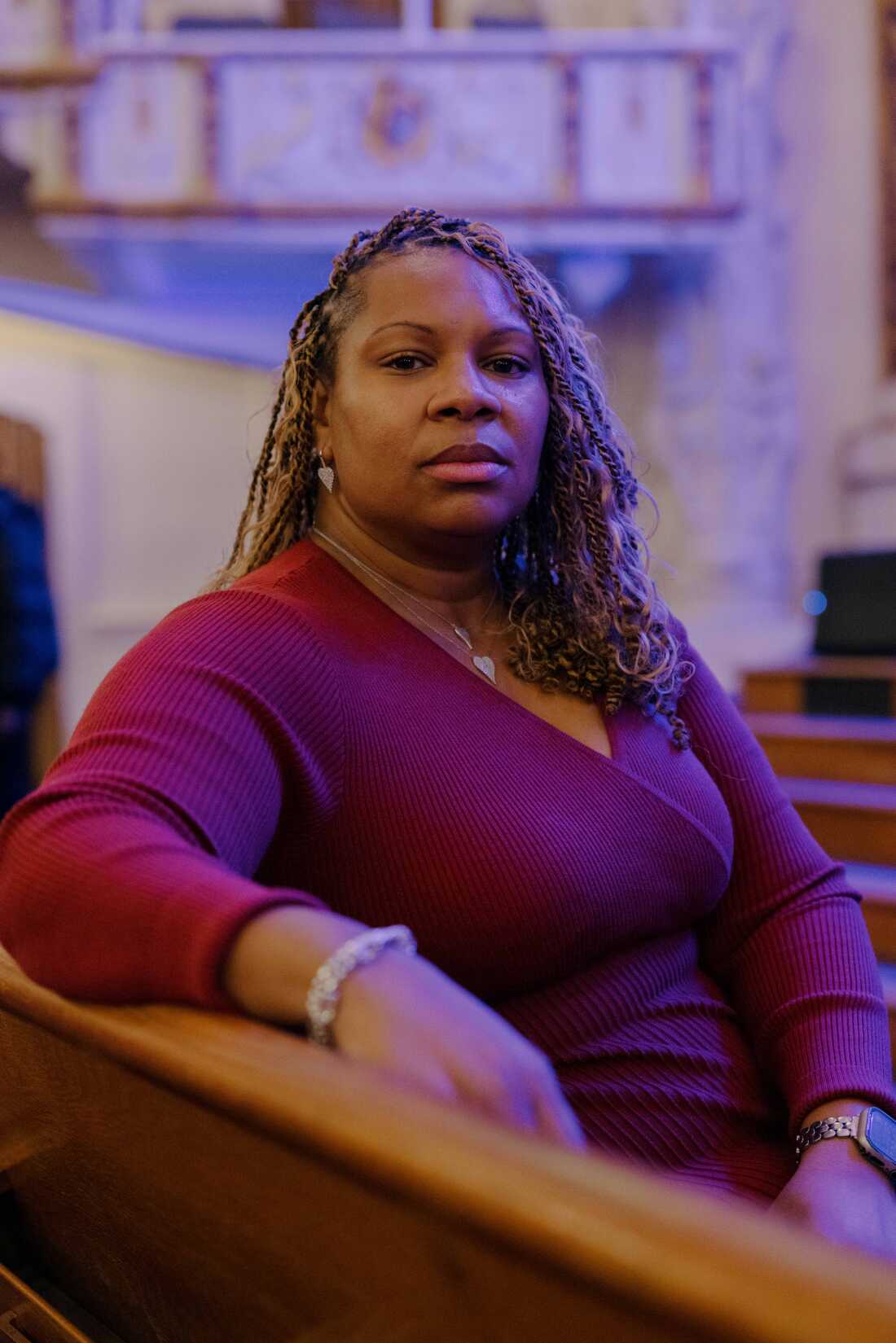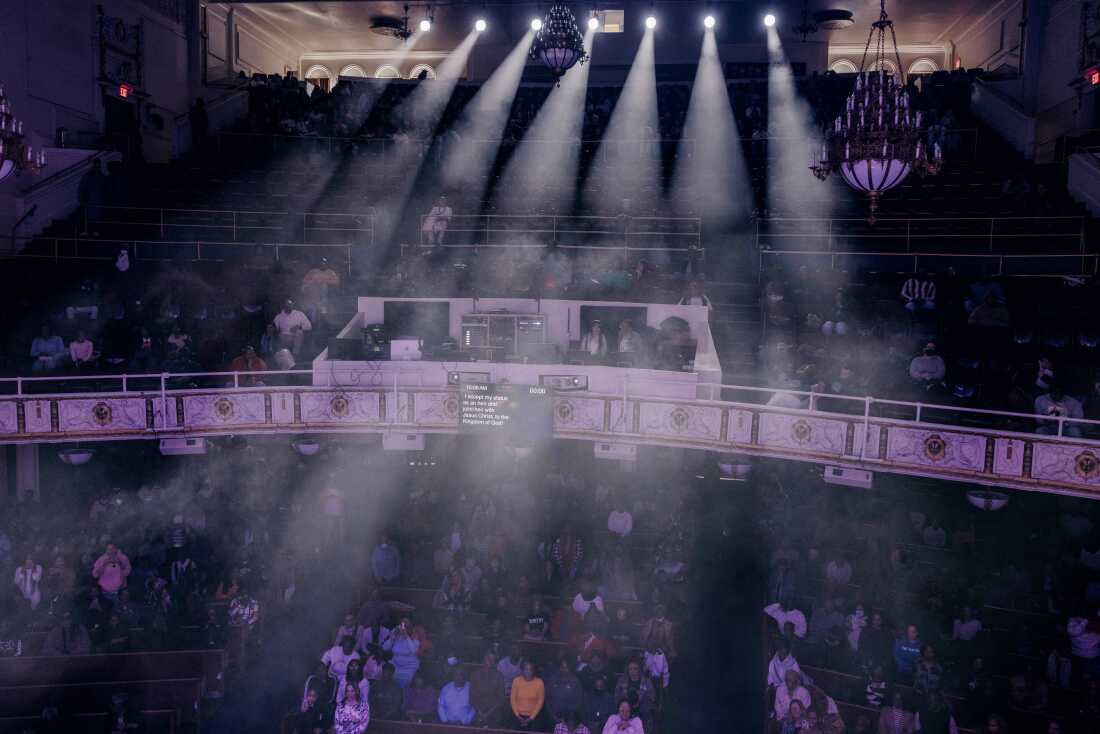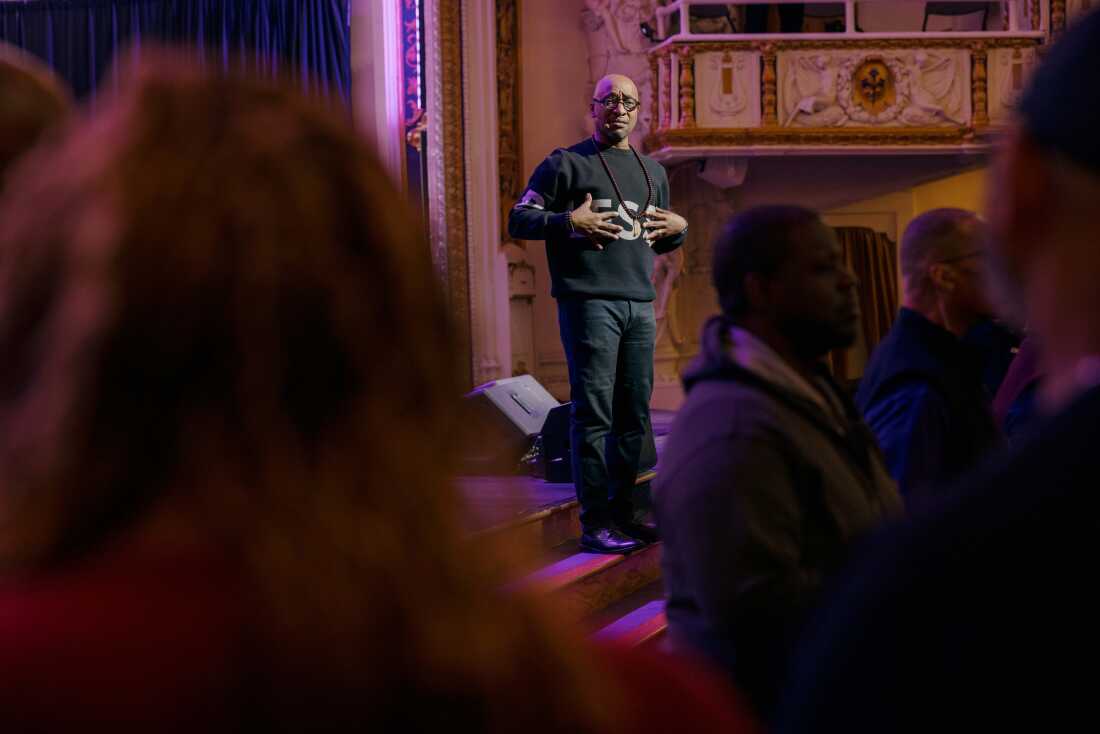
Pastor Michael A. Walrond, who leads the First Corinthian Baptist Church in Harlem, New York, says psychological well being wasn’t mentioned in his household when he was younger. He is attempting to vary that for his congregants.
José A. Alvarado Jr. for NPR
cover caption
toggle caption
José A. Alvarado Jr. for NPR
In case you or somebody you like is experiencing a disaster, name, textual content or chat 988 for the Suicide and Disaster Lifeline.
It was his personal psychological well being disaster that helped Michael A. Walrond, Jr. to grasp and embrace psychological well being care. “Out of nowhere, I had a suicidal ideation,” Walrond recollects. He was in his late 30s on the time, already busy constructing a life and increasing his congregation at First Corinthian Baptist in Harlem, New York.
His Masters of Divinity diploma hadn’t concerned a lot coaching in scientific psychological well being care, and the topic was not part of his household life rising up in New York Metropolis. “I grew up in a conventional West Indian Caribbean family,” he says. “It undoubtedly wasn’t talked about.”
Suicidal ideation — ideas of dying by suicide — is usually a signal of great psychological sickness, and Walrond had not realized on the time that he was coping with despair and nervousness. Analysis exhibits clergy endure from excessive charges of burnout and infrequently wrestle with ideas of suicide and self-harm. After his personal suicidal ideation, Walrond instantly pursued psychological well being care.

Church goers collect for a latest Sunday morning service on the First Corinthian Baptist Church in Harlem, the historic Black neighborhood in higher Manhattan in New York Metropolis.
José A. Alvarado Jr. for NPR
cover caption
toggle caption
José A. Alvarado Jr. for NPR
He now credit remedy with saving his life.
Walrond questioned what number of others in his group have been struggling in silence. “ I feel within the African American group, traditionally, there’s been the normalization of trauma,” he says. “You do not actually see the psychological well being influence.”
At this time, Walrond is battling stigma round psychological well being in his occupation, his group and his congregation — and main by instance.
Bringing psychological well being care into the church

A baptism is carried out earlier than Sunday companies at First Corinthian Baptist Church.
José A. Alvarado Jr. for NPR
cover caption
toggle caption
José A. Alvarado Jr. for NPR
At first, Walrond employed one, part-time therapist to work at First Corinthian. He stands within the church — which he has constructed over 20 years right into a congregation of hundreds — and gestures on the small workplace the place his first therapist labored, “she was on this workplace.” He employed her on a hunch that folks would use her companies, however he hadn’t anticipated simply how a lot demand there can be. He recollects her telling him, “Pastor — lots of people are coming.”
Walrond seen one thing else — that folks have been typically sheepishly making their solution to the therapist’s workplace, embarrassed to confess their function. He determined he wanted to develop to a spot the place individuals felt snug coming.
At this time, the church runs a separate nonprofit, known as H.O.P.E. Heart, funded by way of grants and congregation donations. Lena Inexperienced, the manager director of the middle, opens the door to the clinic, in a separate constructing across the nook from the church. “We at the moment have seven clinicians on employees: three medical doctors, one psychiatrist, three social staff, one psychologist,” explains Inexperienced, who has a doctorate in social work.

Dr. Lena Inexperienced, who has a doctorate in social work, directs the church’s H.O.P.E. Heart. She and different clinicians work to stem suicide threat amongst younger individuals of their group.
José A. Alvarado Jr. for NPR
cover caption
toggle caption
José A. Alvarado Jr. for NPR
Inexperienced says they’ve made progress within the years since they’ve grown this psychological well being hub, however there’s nonetheless widespread stigma locally. In recent times, Black teenagers and adolescents particularly have seen an improve in psychological well being crises, together with suicidal ideation and suicide makes an attempt. Approaching this topic could be troublesome.
For lots of households, there’s type of what I prefer to name the conspiracy of silence,” says Inexperienced. “Like we all know this factor occurred, however we should not be speaking about it publicly. However we all know we have to get assist.”
Inexperienced and Walrond say they noticed a novel alternative in folding scientific well being companies into church. It’s already a spot the place individuals really feel they’ll carry their psychological struggling.

Gabriel Dorvil, 14, nephew of Dr. Lena Inexperienced, listens to the church choir on a latest Sunday morning at First Corinthian Baptist Church in Harlem.
José A. Alvarado Jr. for NPR
cover caption
toggle caption
José A. Alvarado Jr. for NPR
However they’re nonetheless consistently battling stigma across the concept of pursuing psychological well being therapy. Walrond says he tries to disabuse individuals of the concept asking God for assistance is the one solution to pursue psychological well-being. “You may belief God and go see a health care provider to get remedy for hypertension,” he says. “On the subject of psychological well being points, unexpectedly there’s an issue with that.”
“ My technology, , my dad and mom’ technology — if you’re speaking to a therapist, for those who’re getting assist, you’re damaged,” says Marchelle Inexperienced-Dorvil, a congregant at First Corinthian. Inexperienced-Dorvil’s son, Gabriel, participates in a youth group for teenagers on the church aimed toward decreasing suicide threat. She credit the group with serving to their entire household by way of a troublesome time. However she says some nonetheless assume that people who find themselves pursuing therapy are weak. “There’s one thing incorrect, proper?”

The sanctuary of First Corinthian Baptist Church in Harlem throughout companies on a latest Sunday morning.
José A. Alvarado Jr. for NPR
cover caption
toggle caption
José A. Alvarado Jr. for NPR
And but, she says, church has at all times been held as sacred floor for revealing vulnerabilities. The message from the earlier technology, she says, is that “If there’s any sharing, it must be completed solely in a church setting.” The work at First Corinthian Baptist is to indicate people who therapeutic areas are additionally protected.
Bringing suicide into the open
Considered one of Walrond’s methods is to speak overtly about suicide and psychological well being, and to dare others to do the identical. That features his companies. In a video from a service just a few years in the past, he says to the congregation, “ I’ve identified of moments when there have been individuals who went to church, left church after which skilled dying by suicide.”
Persons are swaying and crying, holding one another. Walrond encourages congregation members to do one thing brave — to face as much as come to the entrance of the sanctuary — if they may relate. “Those that are bored with life, and also you’re at that time the place you are virtually prepared to surrender in the present day — I would like you to come back,” he says to them. “I would like you to make your method in the present day.”
Remarkably, individuals made their solution to the entrance.
In getting ready companies like these, Walrond says he seems to be to scripture, amongst different locations, for steerage. “You’ve gotten a number of individuals in scripture who wished to die due to the burden of the duty and the expectations. No totally different,” he explains. “Elijah — who was a prophet — he requested God to take his life. It was Moses who requested God to kill him.”

Church goers hear on as Pastor Michael A. Walrond leads a Sunday morning service on the First Corinthian Baptist Church in Harlem, New York Metropolis, New York, U.S., on Sunday, February 23, 2025.
José A. Alvarado Jr. for NPR
cover caption
toggle caption
José A. Alvarado Jr. for NPR
He believes that there isn’t any distinction between religious wants and bodily wants, together with psychological well being. “A part of the duty,” says Walrond “is to deal with the wants of the individuals as holy.”
In case you or somebody could also be contemplating suicide or is in disaster, name or textual content 9-8-8 to achieve the Suicide & Disaster Lifeline.





